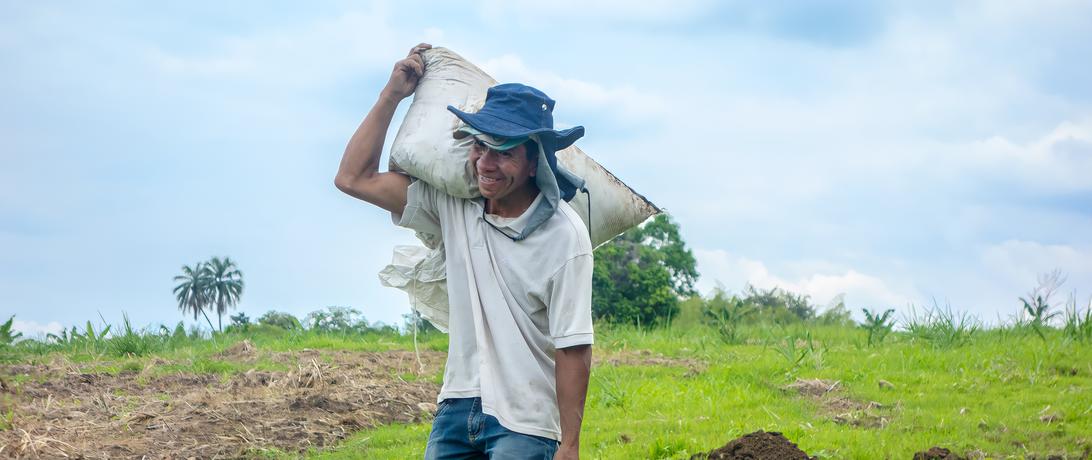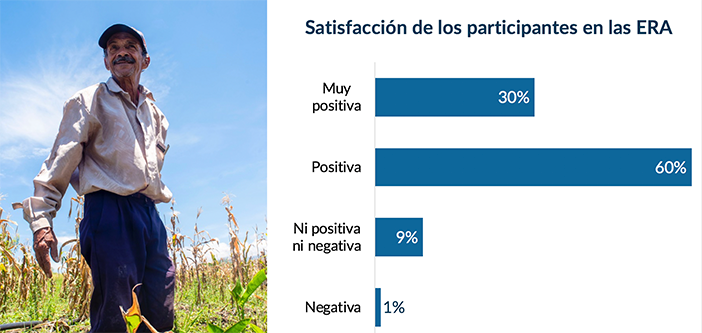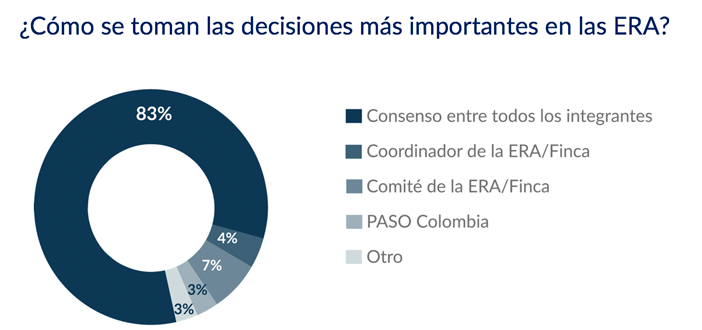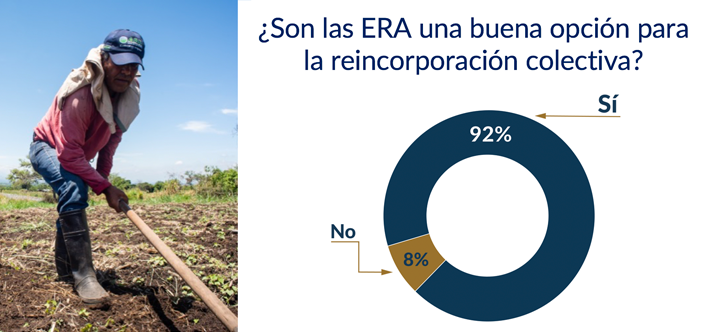
The ERAs are productive and educational collaboration nodes, led by the PASO Colombia program of OEF. These nodes provide peasant communities and ex-combatants with training, technical assistance, access to land, capital, markets, and promote Collaborative Commercial Alliances (CCAs) to help participants sell their products.
The Cifras &conceptos consulting company, contracted by One Earth Future (OEF) to evaluate the perception and satisfaction of the participants in the Alternative Rural Schools (ERA) , delivered the results of this evaluation. Through surveys and focus groups, 82% of the participants of the 6 most consolidated ERAs in the country were consulted after a year of the beginning of the implementation of the model by the PASO Colombia program. The regions covered were: Miranda and Buenos Aires (Cauca), Tuluá (Valle del Cauca), Mutatá, Ituango and Dabeiba (Antioquia).
The Alternative Rural Schools project
The ERAs are productive and educational collaboration nodes, led by the PASO Colombia program of OEF . These nodes provide peasant communities and ex-combatants with training, technical assistance, access to land, capital, markets, and promote Collaborative Commercial Alliances (CCAs) to help participants sell their products. 69% of these participants are ex-combatants in the process of reincorporation and 31% are members of peasant communities. 71% are men and 29% women, being the majority of the adult population between 25 and 54 years old.
A Positive Experience for Participants

The experience of the participants in the ERA was qualified as positive or very positive by 90% of the people consulted. The ex-combatants state that it has been very significant to restore their personal and family relationships, to have productive projects and training options, as well as to strengthen their ties of coexistence with neighboring communities, which has reaffirmed their willingness to lay down their arms and rejoin the permanent civil life. Likewise, the establishment of the ERAs has brought positive effects for neighboring communities through the generation of employment for farmers, purchase and marketing of products, improvement of roads, access to electricity, among others. This has made it possible to favorably transform relations between ex-combatants and communities, reducing the fear and prevention that existed in the territories about the reincorporation process.
Organizational Strengthening
The organizational processes within the ERAs show high levels of linkage to coordination structures: 61% make up the Coordinating Committee of each ERA and 85% are part of the Cooperatives or Associations involved in them. On average, 90% of the participants involved in organizational processes positively value their experience in planning activities, project monitoring, administrative tasks, among others.

83% of those surveyed state that the main decision-making mechanism is consensus among the participants; 91% identify dialogues and agreements as the main way to resolve conflicts; 88% feel confident to talk about their problems and be heard; and 89% consider that their colleagues would be supportive of them if they need help.
Trust Building
Regarding the construction of trust, the results show that from the work in the ERAs this has improved or improved a lot with PASO Colombia (86%), the ex-combatants (78%) and the members of the community (75%). The levels of trust in the private sector have improved for 23% of those consulted and remain the same for 51%. Regarding State institutions, it is noteworthy that the confidence of the participants has improved or greatly improved with respect to the Army (34%) and the National Police (25%), which is positive considering the background of the armed conflict. On the contrary, confidence has decreased a little or has worsened with local governments (39%), departmental governments (38%) and the National Government (54%). To a large extent, the difficulties and delays in the implementation of reincorporation by the State explain the low levels of trust in these institutions, requiring a more effective articulation of the public sector in the processes of reincorporation and economic development of the territories.
Security
Although the armed conflict in the regions where the ERAs are located is still active, and the conditions of public order tend to deteriorate, 40% of the participants state that their personal security situation has improved a lot, while for 39% it remains Same. However, the resurgence of the armed conflict in the territories and the constant threats/homicides against civilian leaders poses an important challenge in terms of local security that may negatively affect the processes carried out in the ERAs during the last year.
access to land
The ERA model has allowed access to land through rental (31%), community property (31%), own ownership (15%) and loan (15%); however, the participants point out the importance of accessing their own land as an element of long-term rooting and permanence in the territory.
Productive projects
The participants of the ERAs own the productive projects through the cooperatives and associations that participate in them. In this first stage of development and consolidation, 21% of the participants state that they have already begun to receive some income from their participation in the ERAs, while 15% indicate that they obtained income derived from the Collaborative Commercial Alliances (ACC) that are held there. promote. 26% of the participating social organizations have already begun to receive income from the ERAs or the ACCs. However, the participants draw attention to the need to further strengthen the marketing of products, pointing out barriers that exist for access to local markets such as the cost of inputs and strong competition with local producers in some areas.

Finally, the ERAs are considered a good alternative for economic reincorporation for 92% of the participants. On average, 81% of the participants rate the performance of productive projects as good or excellent. The implementation of crops (75%), home gardens (69%), animal husbandry (66%), support for productive infrastructure (45%) and product marketing (43%) stand out as the main initiatives developed to date. moment. In addition, 75% of the participants have received training in the ERA, through allies such as SENA, on topics related to their activities such as: agricultural training, organizational strengthening, food handling, administration and finance. 85% of people rate this training as excellent or good.
A summary with graphs of the study can be downloaded here . The full report will be available in Spanish and English in April. PASO Colombia is very pleased with the results and is using the feedback received to further improve its work and support the expansion of the ERA model to 20 municipalities by the end of 2019.
Article Details
Published
Topic
Program
Content Type
News